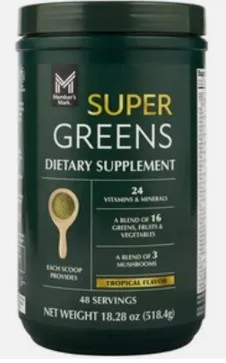A national public‑health alert is underway following a multistate outbreak of Salmonella infections traced to a popular powdered dietary‑supplement product. Health authorities have linked at least 11 illnesses—including three hospitalisations—across seven U.S. states to a “super greens” powder sold under a major retail house‑brand label at a warehouse chain store.
What Happened
Investigators found that the outbreak originates from a single lot of organic moringa leaf powder imported from India. This ingredient was used in the “super greens” supplement sold at the warehouse retailer. Analytical testing confirmed the presence of Salmonella in opened product samples collected from the homes of infected individuals. Following the traceback, the retailer removed the product from shelves nationwide and initiated a full recall of all bottles of the affected label, regardless of batch or expiry date.
Illnesses and Risk Populations
The 11 confirmed cases span Florida, Kansas, Michigan, New York, North Carolina, South Carolina and Virginia, with illness onset dates ranging from May to September. Symptoms among those affected included diarrhea, fever, stomach cramps, and vomiting. While most recovered within days, hospitalisation was required in three instances—underscoring the potential severity of the outbreak for young children, older adults or people with weakened immune systems.
Why Consumers Should Be Alert
- Discontinue use: Anyone who purchased the implicated supplement should stop consuming it immediately. The recall covers all containers of the product, irrespective of lot code or use‑by date.
- Return or dispose: Consumers are advised either to return the product to the place of purchase for a refund or to safely discard it.
- Sanitise surfaces: Because powder residue may linger, areas and containers that held the product should be cleaned and sanitised to avoid cross‑contamination with other foods or supplements.
- Monitor health: If you feel unwell after consuming the product—particularly if you experience persistent gastrointestinal symptoms—seek medical attention and inform your healthcare provider about this exposure.
Broader Implications for Supplement Safety
This outbreak highlights ongoing risks within the dietary‑supplement supply chain. Key issues include:
- Imported ingredient vulnerabilities: While supplements are regulated differently than conventional foods or drugs, contamination of imported raw materials can go undetected until illness appears.
- Quality‑control gaps: Powdered supplements, especially those with botanical or herbal ingredients, may carry unique microbiological risks if drying or processing controls are inadequate.
- Under‑recognized hazard: Many consumers do not view dietary supplements as potential exposure points for foodborne illness—yet the same pathogens that contaminate foods can also affect supplements.
- Need for vigilance: Healthcare providers, retailers and consumers should monitor for recalls, maintain awareness of ingredient sourcing and traceability, and ensure safe handling of all ingestible products.
What Retailers and Practitioners Can Do
Retailers should confirm removal of all indicated products, update inventory systems to flag affected lots, and notify customers who purchased the product (especially via online or membership‑based models). Healthcare professionals should ask patients about supplement use when unexplained illness arises and educate them about proper food safety measures, including with dietary supplements.
Final Thought
While the concept of a “super‑greens” supplement may seem benign or beneficial, this incident is a reminder that any ingestible product—regardless of positioning—can be a vector for serious illness. Safe sourcing, rigorous testing and proactive risk communication are essential. For consumers, the safest approach is to stay informed, treat supplements like any other food product in terms of vigilance, and heed recall notices promptly.















Leave a Reply